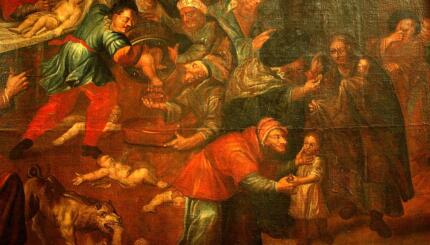The frequent overlapping of Easter and Passover — of the Christian Holy Week with our eight-day celebration of Passover — merits attention. Unlike the yoking of Christmas and Hanukkah, Easter and Passover are festivals of equal gravity. Side by side they bring to light the deep structures of both religions.
Looking for Passover-Easter resources for interfaith families? Click here!
Scheduled to Coincide in the Spring
First, their inviolable matrix is spring. In each case, the calendar is adjusted to ensure that the holiday is celebrated early in the spring. For the church, which believed that the resurrection took place on a Sunday, the First Council of Nicaea in 325 determined that Easter should always fall on the first Sunday after the first full moon following the vernal equinox. In consequence, Easter remained without a fixed date but proximate to the full moon, which coincided with the start of Passover on the 15th of the Hebrew month Nissan.
By the same token, the rabbis understood the verse “You go free on this day, in the month of Aviv” (Exodus 13:4) to restrict Passover to early spring — that is in a transitional month when the winter rains end and the weather turns mild. The word “Aviv” actually means fresh ears of barley.

Help us keep Jewish knowledge accessible to millions of people around the world.
Your donation to My Jewish Learning fuels endless journeys of Jewish discovery. With your help, My Jewish Learning can continue to provide nonstop opportunities for learning, connection and growth.
Moreover, since the had stipulated that the month in which the exodus from Egypt occurred should mark the start of a new year (Exodus 12:2), the end of the prior year was subject to periodic extension in order to keep the Jewish lunar calendar in sync with the solar year. Thus, if the barley in the fields or the fruit on the trees had not ripened sufficiently for bringing the omer [the first barley sheaf, which was donated to the Temple] or the first fruits to the Temple, the arrival of Passover could be delayed by declaring a leap year and doubling the final month of (Tosefta Sanhedrin 2:2).
In short, Easter and Passover were destined to coincide time and again.
Both Festivals Emphasize History and Hope
Second, in both festivals nature and history converge with a resounding message of hope. The renewal of nature that comes with spring amplifies the promise of redemption embedded in the historical events being commemorated. To each faith community, God’s presence manifests itself in two keys, in nature and through history.
Yet, in both, the preferred medium is history, a legacy of the biblical shift to monotheism. Judaism and Christianity rest firmly on the foundation stories recounted ritually in their respective spring festivals. In Egypt, the family of Jacob had morphed into a nation welded together by the bitter experience of oppression.
Redemption by God imbued them with the national mission to create a body politic of a nobler order. Though their descendants failed, the body of religious literature which recorded their efforts and voiced their ideals would challenge humanity even as it would comfort them in their long exile. To recall the exodus in dark times nurtured the yearning for a future restoration, which is why Passover ends with the reciting of a haftarah [prophetic reading] that bristles with this-worldly messianism (Isaiah 10:32-12:6).
If Passover is largely about Egypt, Easter is largely about Passover. Its historical setting is Jerusalem at Passover, the Last Supper could well have been an embryonic seder, and Jesus is fated to become the paschal lamb. Indeed, the new Catechism of the Catholic Church calls Easter “The Christian Passover” (no. 1170) and speaks of the “Paschal mystery of Christ’s cross” (no. 57).
The good news is that the death of one has the capacity to save many. The resurrection of Jesus is the ultimate affirmation of life or in the words of the Byzantine liturgy:
Christ is risen from the dead!
Dying, he conquered death;
To the dead, he has given life (no. 638).
Finally, because the message of both festivals is so central to the belief system of each faith community, it interlaces the liturgy year round. In the Haggadah we read that Rabbi Elazar ben Azariah was already advanced in years before he fathomed that the exodus from Egypt should be recalled by every Jew twice daily, in the evening as well as in the morning. That is the reason for the addition at the third paragraph of the Shema [a prayer said twice daily] in which this bedrock fact is affirmed. God’s compassion obliges us to sanctify our lives.
Correspondingly, for Catholics and many Protestants the weekly sacrament of communion, reenacting the last supper, turns God’s saving grace into a lived reality.
Passover is Communal, While Easter is Individual
Still for all their commonalities, Passover and Easter diverge fundamentally. While both festivals are about delivery from a state of despair, be it slavery or sin, Passover heralds the birth of the Jewish people as a force for good in the comity of nations. In contrast, Easter assures the individual Christian life eternal. Passover summons Jews collectively into the world to repair it; Easter proffers a way out of a world beyond repair.
Passover reflects a worldview that devalues life after death and privileges the community over the individual. Easter bespeaks a religion that reverses both sets of priorities, enabling it to comfort those who had lost faith in the gods of Rome.
Passover’s Connection to Rosh Hashanah
It is well known that Passover is not the only Jewish new year, that in fact it came to share that role with Rosh Hashanah. Whereas our months are numbered from [when Passover falls], the years are counted from [the month in which falls]. The reason for that anomaly is the development of Rosh Hashanah, after the canonization of the Hebrew Bible, perhaps concomitantly with the emergence of Christianity, into a festival that addressed itself solely to the fate of the individual.
The Mishnah stresses that on Rosh Hashanah alone God has “all inhabitants of the world pass before Him, like flocks of sheep” (Rosh Hashanah 1:2). On the other three pilgrimage festivals, including Passover, the world is judged by God collectively. The expansion of the nameless first day of the seventh month, when loud blasts were to be sounded (Leviticus 23:24 and Numbers 29:1), into a solemn day of judgment for every single member of humanity suggests a Jewish response to a society with a heightened sense for the importance of the individual.
The result, however, is not a transformation of Judaism. Its deep structure remains intact. Rosh Hashanah joins Passover; it does not replace it. While the valence of the individual is definitely elevated, the priority of the group is not devalued. Judaism continues to be animated by a spirit of communitarianism.
Likewise, the dominant orientation stays this-worldly. Rosh Hashanah and Yom Kippur are not about getting into heaven. Our profusion of prayers carries aloft a modest request of God: to give us but one more year to try again, to live our life in such a manner as to make a difference. Our task is to mend the world, not flee it. The retention of two new years, one in the spring, the other in the fall, bespeaks the remarkable effort to keep polarities in balance.
Reprinted with permission of the Jewish Theological Seminary.
Prep for Passover like a pro with this special email series. Click here to sign up and you’ll receive a series of helpful, informative, and beautiful emails that will help you get the most out of the holiday.


